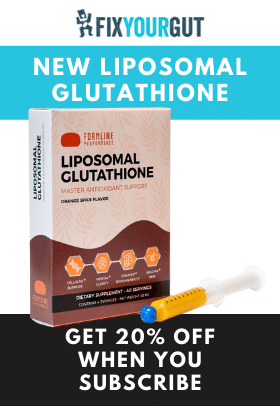The standard American diet lacks many nutrients that we need for optimal health. Though we have access to a wide variety of foods in our grocery store that are nutrient-dense, many choose fast food convenience in our fast-paced modern world. Many Americans eat fast food daily, devoid of many trace minerals that we need in our diet. Various factors affect our need for proper intake of nutrients, including our age, biological sex, genetics, epigenetics, and our environment, to name a few. Fix Your Gut has developed an Optimal Health Blueprint, supplement recommendations that should hopefully improve your overall health. Of course, before starting any of our recommendations, consult your healthcare professional. So, why do we recommend you supplement with specific nutrients to improve your health?
Why do We Recommend Frequent Intake of Certain Nutrients?
Many Americans are deficient in many of the nutrients we recommend in the Optimal Health Blueprint because of a poor diet. American standard diets are low in Omega-3 fatty acids, zinc, iodine, and magnesium. Increased consumption of plant-based oils that contain higher amounts of linoleic acid and other omega sixes and a decreased ingestion of seafood and grass-fed meats has led to a disapproving ratio difference between omega three and omega six; as high as 20:1! Omega-3 fatty acids are crucial for optimal brain/heart health and function, proper immune system regulation, and healthy vision. Finally, people who avoid seafood ingestion are at a greater risk for having an Omega-3 deficiency. The conversion of alpha-linoleic acid, another one of the Omega-3 fatty acids found in plants, to the other Omega-3 fatty acids your body uses, docosahexaenoic and eicosapentaenoic acid (DHA/EPA), depends on individualized factors, such as biological sex and genes, and can be inadequate for some people.1 2 3 4 5
A majority of American’s are deficient in the mineral magnesium, and it might be as high as eighty percent, as I have written about extensively in Fix Your Gut. Magnesium supplementation is crucial for optimal brain, heart, muscle, nerve, and joint health. Symptoms include chronic anxiety, insomnia, restless legs syndrome, muscle spasms, muscle pain, migraines, arrhythmia, and elevated blood pressure. Even if you eat a “perfect” diet, you should supplement magnesium. You will still have to eat a ton of nuts, brown rice, avocados, and spinach to keep from developing a deficiency. To get around 400 milligrams (mg) daily, you would have to consume one cup of cooked spinach (157 mg), one ounce of pumpkin seeds (150 mg), one avocado (56 mg), and one cup of cooked brown rice (86 mg) daily on average (449 mg of mag total). Most ingested plant-sourced magnesium is bounded to phytic acid, so we do not know how much-ingested magnesium is absorbed and utilized.6
Zinc deficiency and copper dysregulation are also common for people who eat a standard American diet. Both minerals are essential for our health. However, if either one becomes imbalanced, poor health occurs. Too much zinc can interfere with the metabolism of copper and vice versa. Zinc is an essential mineral for testosterone production in males (Boron is also recommended as an optional supplement in our male supplement stack to improve testosterone production further) and is crucial for our immune system’s functioning. Selenium deficiency is less common in America. However, the mineral is vital for the proper conversion of thyroid hormones from inactive (T4) to active (T3) and vice versa, so we recommend supplementing with it while you are supplementing with iodine. Iodine ingestion/supplementation in the United States is also inadequate for many people. Finally, supplementation of biotin and silica for women can help improve the health of your skin, hair, and nails.7 8 9 10 11 12
Supplementing with other nutrients, including B vitamins, vitamin C, and vitamin K2 may further improve someone’s health. We recommend supplementation with the B vitamin complex, B-Minus. It does not contain any folate or methylcobalamin for those who have issues with an upregulated methyl cycle. If you are an undermethylator or have MTHFR, MTRR, or COMT polymorphisms, you might need a B vitamin complex containing methyl donors like Thorne Stress B-Complex. We recommend supplementing with hydroxo B12 which should also be acceptable for overmethylators because it has only small amounts of methylated vitamin B12. Vitamin C supplementation can improve one’s health as a potent antioxidant reducing oxidative stress, and vitamin C is crucial for proper immune function and collagen formation. Suppose you have oxalate metabolism issues and vitamin C causes or worsens your joint pain. In that case, you might want to not supplement with it because, for some people, excessive vitamin C is converted into oxalic acid (cadmium toxicity seems to be the primary catalyst). Finally, vitamin K2 is essential for bone health and mitochondrial function.13 14 15 16
Most Americans are also deficient in vitamin A (retinol) and vitamin D. We at Fix Your Gut; however, caution supplementation of both unless needed. Both vitamins are fat-soluble, and issues can occur from both by over-supplementation. Retinol should be obtained through ingestion of retinol-containing foods of all possible, including pastured animal liver, pastured eggs, and pastured butter/ghee. Vitamin D should be obtained from proper exposure to ultraviolet B radiation from our sun.17 18 19
The supplements recommended for the Optimal Health Blueprint are from some of the most reputable brands within the natural health industry. Hopefully, the Fix Your Gut Optimal Health Blueprint’s supplement recommendations will improve your overall health and fix common deficiencies in our standard American diet.
- https://lpi.oregonstate.edu/mic/other-nutrients/essential-fatty-acids ↩
- https://chriskresser.com/how-too-much-omega-6-and-not-enough-omega-3-is-making-us-sick/ ↩
- https://chriskresser.com/how-much-omega-3-is-enough-that-depends-on-omega-6/ ↩
- https://openheart.bmj.com/content/3/2/e000385 ↩
- https://openheart.bmj.com/content/5/2/e000946 ↩
- http://Dean, Carolyn. The Magnesium Miracle, Ballantine Books, December 26, 2006. ↩
- https://lpi.oregonstate.edu/mic/minerals/zinc ↩
- https://lpi.oregonstate.edu/mic/minerals/copper ↩
- https://lpi.oregonstate.edu/mic/minerals/selenium ↩
- http://Bowthorpe, Janie. Stop the Thyroid Madness, Laughing Grape Publishing, 2011. ↩
- http://Brownstein, David. Iodine: Why You Need It, Why You Can’t Live Without It, Medical Alternatives Press, 2009. ↩
- https://chriskresser.com/selenium-the-missing-link-for-treating-hypothyroidism/ ↩
- https://chriskresser.com/selenium-the-missing-link-for-treating-hypothyroidism/ ↩
- https://lpi.oregonstate.edu/mic/vitamins/vitamin-C ↩
- http://Lynch, Ben. Dirty Genes, HarperOne, 2018. ↩
- https://lpi.oregonstate.edu/mic/vitamins/vitamin-C ↩
- https://lpi.oregonstate.edu/mic/vitamins/vitamin-A ↩
- https://lpi.oregonstate.edu/mic/vitamins/vitamin-D ↩
- https://www.westonaprice.org/health-topics/vitamin-a-mazing/ ↩







Great article. I’ve found that most vitamin, mineral, Omega-3, etc. deficiencies can be alleviated by the supplementation of a few core foods: (1) grass-fed liver; (2) wild caught fish eggs; (3) grass-fed bone marrow; and (4) grass-fed bovine testicles (for males). These core foods, plus ample sunlight, provide generous amounts of high quality vitamind A, B, C, D, K2, iron, magnesium, choline, and omega-3’s, and much more. Plus, they are all the natural forms of these key nutrients, which lowers the risk of overdose, enables the most highly bio-available forms (no synthetics), have no fillers or chemicals, and can be taken at any time during the day, as they are “food” and not a “lab-created supplement.” So, take them well, or eat them well. Nature’s food provides the answers!
Ultimately I agree, but many sadly just want convenience.